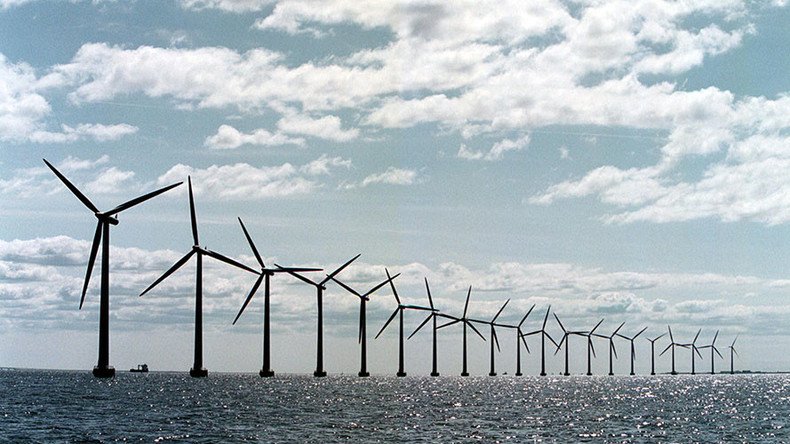Giant Atlantic wind farms could power entire world – study

A new research paper boldly suggests that one monumental floating wind farm in the north Atlantic could theoretically power our entire civilization.
"In the winter, North Atlantic wind farms could provide sufficient energy to meet all of civilization's current needs," claims the report, produced by atmospheric scientist Anna Possner and climatologist Ken Caldiera, published Monday in the Proceedings of the National Academy of Sciences.
"Even in the relative calm of summer, the upper geophysical limit on sustained wind power in the North Atlantic alone could be sufficient to supply all of Europe’s electricity,” the report reads.
Satellite captures images of world's largest floating solar farm in China (PHOTOS, VIDEO) https://t.co/rkvyfLgOEJ
— RT (@RT_com) August 6, 2017
The study used computer models which compared the total output of huge onshore wind farms in Kansas with the potential output of an equivalent-sized wind farm floating in the Atlantic ocean. At onshore facilities, each turbine weakens the power generation potential of each additional turbine downwind of it in a phenomenon known as a "wind shadow."
The study found that such a gigantic wind farm could capitalize on low-pressure systems throughout the winter which more efficiently combine the upper atmospheric winds with the surface level winds, producing greater yields in wind farm power generation potential.
"We found that giant ocean-based wind farms are able to tap into the energy of the winds throughout much of the atmosphere, whereas wind farms onshore remain constrained by the near-surface wind resources," said co-author Anna Possner.
"Wind power generation over some ocean areas can exceed power generation on land by a factor of three or more" by leveraging far more atmospheric kinetic energy transported downwards over the oceans than is possible over land.
Global nuclear power capacity could double by 2050 https://t.co/gJXlEO1Agf
— RT (@RT_com) August 11, 2017
Charlie Zender, a physicist at the University of California, praised the theoretical potential of the research but said the “relevance to energy policy is low” citing the extremely high construction, operation and maintenance costs of building floating wind farms which would be further compounded by the density of turbines required in the research.
"While no commercial-scale deep water wind farms yet exist, our results suggest that such technologies, if they became technically and economically feasible, could potentially provide civilization-scale power," the study concluded.












